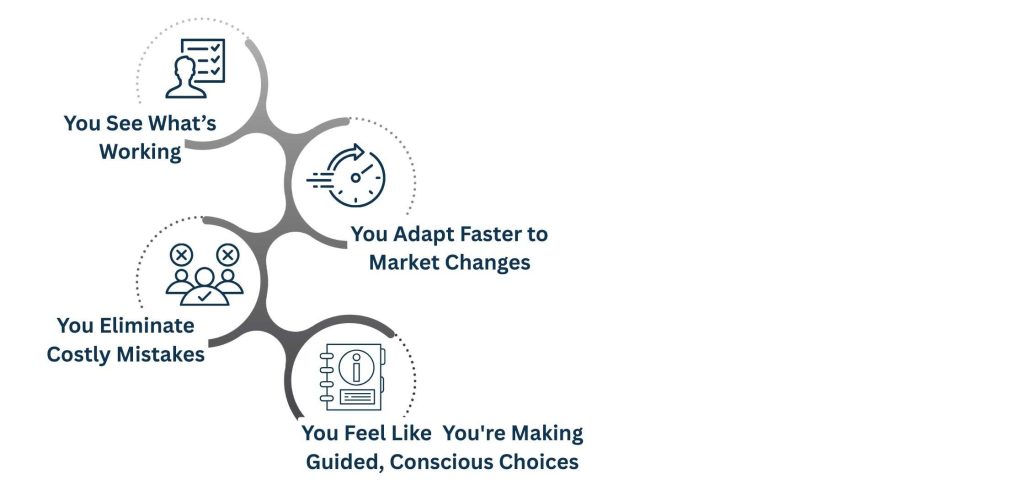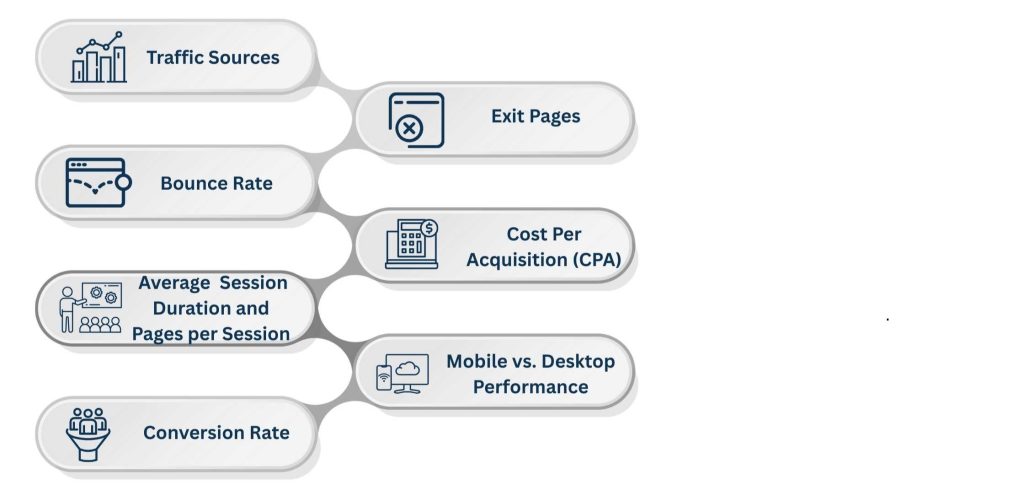Introduction
In the age of data and digital, running campaigns isn’t good enough; you need learnings to show, you need insights to share, and ROI to prove.
That is why analytics serve as the killer app for any successful website marketing strategy.
From knowing where your visitors are coming from, to where they’re going on your site, to what pages are converting best (not to mention the ones that aren’t), analytics shows you a clear snapshot of your game plan — and what’s killing it. The result? More intelligent decisions, better targeting, and higher returns on investment (ROI).
Yet, many businesses don’t use analytics to its full potential or get lost in a sea of numbers without clear action steps.
In this blog, we’ll cover:
- Why analytics is critical to optimizing your website marketing strategy.
- The key metrics you should pay attention to.
- How to turn data insights into actionable improvements.
- Tools and best practices for boosting ROI through smarter tracking.
Why Data-Driven Marketing Outperforms Guesswork Every Time
During the early days of digital, rising companies winged it, served campaigns born of trends, anecdotes, or other people’s work. But in the future, 2024 and beyond, we can’t keep doing that. If you’re not letting data drive your decisions, you’re flying blind — and very likely wasting time and money.
Analytics is the foundation of any viable website marketing strategy today. With data, you can see exactly how your audience acts, where you’re having success, and where you’re losing people.

Here’s why Data-Driven marketing always comes out on top:
1. You See What’s Working
Analytics informs you about what channels bring you traffic, what pages keep individuals engaged, and what campaigns convert. Without this understanding, you could be pouring your money into strategies that aren’t paying off, or overlooking opportunities that are right under your nose.
2. You Eliminate Costly Mistakes
Guesswork leads to overspending on ads, targeting the wrong audience, or focusing on content that doesn’t resonate. Data helps you avoid these pitfalls by showing you real performance, so every dollar spent is optimized for ROI.
3. You Adapt Faster to Market Changes
Consumer habits turn on a dime. With analytics, you can start to see trends, dips in interest , or shifts in traffic source early enough to pivot your strategy before it has an impact on your bottom line.
4. You Feel Like You’re Making Guided, Conscious Choices
Instead of meeting debates on opinions, we have clear answers in the data. You know where to double down, what to fix, and what to stop — taking the guesswork out of your marketing approach.
Suffice it to say, going by gut feelings is a dangerous proposition. A data-based website marketing strategy means you’re always getting better, always optimizing, and always growing stronger in the pursuit of better ROI.
The 7 Metrics Which Matter Most to Your Marketing
In the era of big data, it is too easy to be overwhelmed by numbers that lead to no action. The difference between a good marketer and a Great marketer is knowing what to measure and why that matters in terms of optimizing your website marketing strategy and increasing your ROI.

Here are the core metrics that professional marketers focus on and why they’re important:
1. Traffic Sources
Knowing the origin of your visitors (organic search, paid ads, social media, referrals, direct traffic) enables you to see which sources bring the highest-value traffic for your business. If all of your traffic is coming from one source, you’ll know where you need to put in more or diversify.
2. Bounce Rate
The bounce rate indicates what percentage of people leave after looking at only one page on your site. A high bounce rate might signal that your landing pages aren’t engaging, your content isn’t relevant, or your site is too slow. This increases engagement and helps the site to convert more.
3. Average Session Duration and Pages per Session
These metrics show you how long visitors spend on your site and how many pages they view. If people don’t stay for long, that could be a sign of a bad user experience or bad content. The more time in conversation, the more likely they convert.
4. Conversion Rate
This is one of the key statistics. Regardless of whether it’s a sale, a form submission, or a newsletter sign-up, your conversion rate tells you how well your site converts visitors into leads or buyers. Even slight improvements in this department can drastically boost ROI.
5. Exit Pages
Analytics shows you where visitors are dropping off. If a large percentage of users exit on a key sales or contact page, it’s a sign that something needs fixing — whether it’s unclear messaging, poor design, or technical issues.
6. Cost Per Acquisition (CPA)
For paid campaigns, knowing how much you’re spending to acquire each customer is critical. Tracking CPA ensures your marketing spend stays efficient and profitable.
7. Mobile vs. Desktop Performance
With mobile outpacing desktop traffic, it’s more important than ever to monitor how your site is doing across devices. Rankings and Conversions Suffer From Crappy Mobile User Experiences Without a return on the investment of time and money when managing a website, most businesses will not make the needed changes.
Concentrating on these metrics enables you to strip away the clutter and make decisions based on facts to achieve direct improvement of your website and marketing ROI.
How to Transform Data Insight into Marketing Improvements
It’s one thing to collect analytics, but the true growth occurs when you know what to do with that information. Far too many companies are tracking measurements but not taking clear and measurable actions in order to improve performance. And the real power of analytics comes when you turn those insights into tangible actions that refine your website marketing.

Here’s how top marketers turn data into results:
1. Optimize High-Performing Channels
If analytics shows that most of your traffic and conversions come from organic search or a specific social platform, double down on what’s working. Invest more in SEO, create targeted content, or boost ad spend where ROI is already strong.
2. Fix High Bounce Rate Pages
Find out which pages your visitors are leaving. Dive into these pages to find slow load times, bad design, ineffective calls-to-action (CTAs), or irrelevant content. Minor adjustments—such as clarifying your headlines, improving offers, or speeding up page performance—can significantly decrease bounce rates and keep visitors’ attention.
3. Improve Conversion Paths
If traffic is strong but conversions are low, analyze your user journey. Are CTAs clear? Is your checkout process too complicated? Do forms ask for too much information? Use data to streamline these touchpoints and remove friction.
4. Refresh Underperforming Content
Pages with low session durations or high exit rates may need updated content. Add value by improving readability, incorporating keywords, adding visuals, or addressing common customer questions to boost engagement.
5. A/B Test Key Elements
Analytics can highlight where performance is lagging, but testing reveals what works better. Test different headlines, CTAs, images, or landing page layouts based on data-driven hypotheses, not guesses.
6. Adjust Campaign Targeting
If you paid traffic isn’t converting, take a look at your audience targeting and ad messaging. Analytics enables you to get smarter about who you’re trying to reach and make sure your landing pages are in tune with ad promises.
7. Enhance Mobile Experience
If mobile users experience lower engagement or make a higher number of bounces, work smarter with flexible designs, pages that load quickly, and simple navigation, so you don’t fail to grab extra conversions from mobile traffic.
When we follow these insights and actually implement them in our businesses, we open up a feedback loop of what is nothing less than ongoing incremental improvement – every change leads to more conversion and ROI, and improved performance.
Best Software to Track and Optimize Your Website Marketing Strategy
You can’t make improvements to what you can’t measure — and that’s why it’s so important to have the right analytics tools to optimize your website marketing strategy. In 2025, there is no paucity of platforms that provide insights, but the difference comes from using the tools that can deliver actionable, clear data, without overwhelming you.

These are some of the top tools that marketers rely on to measure performance, identify opportunities, and increase ROI:
1. Google Analytics 4 (GA4)
Being the industry’s benchmark, you can get in-depth information on website traffic, user activity, and conversions with GA4. You need to know where visitors are coming from, how they are using your website, and what marketing channels are resulting in sales or leads.
2. Google Search Console
Great for SEO-driven campaigns, this free resource allows you to track your website’s appearance in search results. It shows keyword rankings, CTR (click-through rate), indexing problems, and, more importantly, it shows you pages and keywords that have rank potential.
3. Hotjar or Microsoft Clarity
We provide heatmaps, session recordings, and user behavior analytics. They exactly illustrate how visitors move through your site — what they click on, scroll, and get caught on — which will help you optimize the layout, CTAs, and how your content flows.
4. SEMrush or Ahrefs
For businesses that want a deep dive into SEO and competitive analysis, these platforms offer you visibility into your keyword performance, backlinks, site audits, and what your competitors are doing. They’re strong for refining your content marketing efforts and growing organic traffic.
5. HubSpot or ActiveCampaign
Integrates CRM, email marketing, and automation with powerful analytics. They are perfect for monitoring your lead generation, nurturing campaigns, and customer journeys.
6. Google Data Studio (Looker Studio)
This tool helps consolidate data from multiple sources (GA4, Search Console, social media, ads) into customizable dashboards, making it easier to visualize performance trends and share reports with your team.
7. Meta Business Suite & Ad Platforms
If you have included social media or paid ads in your wider strategy, then utilize native analytics tools from Facebook, Instagram, LinkedIn, or Google Ads to track the effectiveness of your campaigns and tweak targeting or budgets as it happens.
The idea is for businesses to use these tools to know exactly what is happening with their website so they can adjust and optimize their website and marketing campaigns in search of the best results possible.
Conclusion
In the digital era, hoping gives way to tracking, analyzing, and optimizing in order to push your marketing plan’s performance even further. It’s the businesses that are not working harder, but just smarter, and being intelligent about the analytics that are driving real growth and higher ROI, not working themselves into the ground.
A data-driven website marketing strategy helps you:
- Focus on what’s working
- Eliminate wasted time and budget
- Improve user experience and conversion rates
- Adapt quickly to changing trends and customer behavior
But success doesn’t come from just collecting data — it comes from knowing how to turn that data into action. With the right tools, clear metrics, and a mindset of continuous improvement, you can fine-tune your marketing efforts, drive more qualified traffic, and convert more visitors into customers.
At Tasks Expert, we provide skilled virtual assistants and marketing support to help businesses manage analytics, track performance, and implement data-driven strategies. From setting up dashboards to monitoring campaigns and suggesting optimizations, we take the guesswork out of your marketing, so you see better results, faster.
Ready to transform your website marketing strategy and boost your ROI
About Us
Tasks Expert offers top-tier virtual assistant services from highly skilled professionals based in India. Our VAs handle a wide range of tasks, from part time personal assistant to specialized services like remote it support services, professional bookkeeping service etc. Furthermore, it helps businesses worldwide streamline operations and boost productivity.
Ready to elevate your business? Book a Call and let Tasks Expert take care of the rest.









